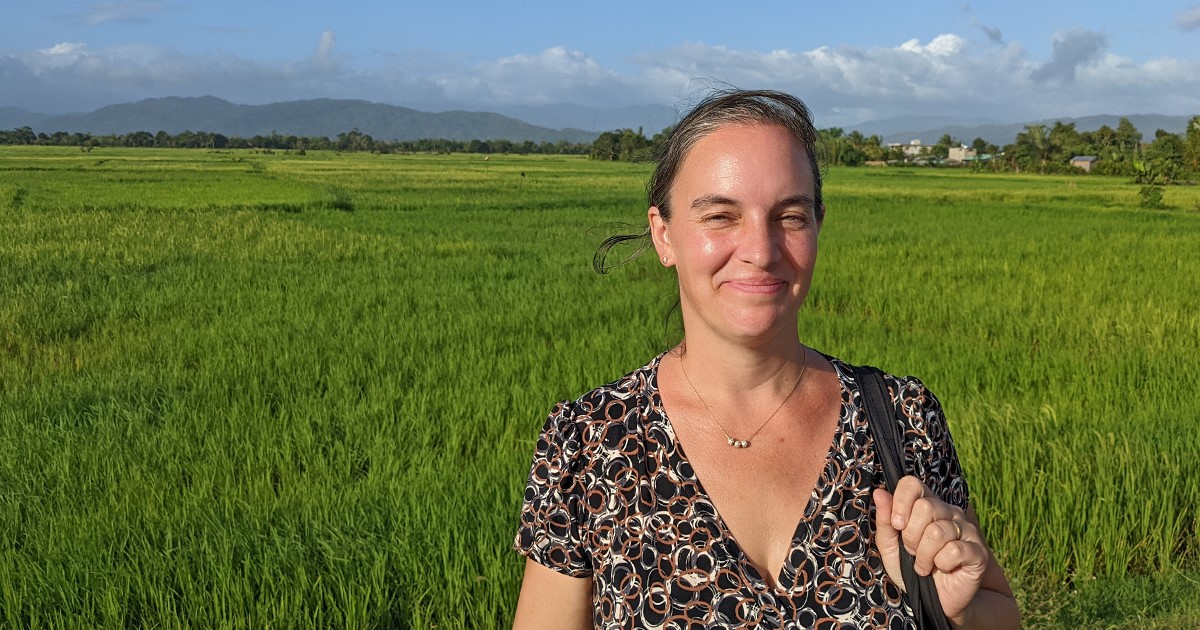
Laura Tilghman learned about other cultures as a child through extensive family travel. In first grade, yet another new experience came when her family hosted a Mexican exchange student for a year.
Vera was in sixth grade, and Tilghman loved hearing about her friend’s way of life, but Tilghman didn’t know there was a word for the study of other societies until she was in college earning her bachelor’s degrees in environmental studies and environmental biology.
Anthropology, it’s called.
Since 2015, Tilghman has taught courses that take students to other lands and advance the University’s Habits of Mind focus on critical thinking, purposeful communication, and self-directed learning by showing them differences in how humans are today and in different time periods around the world.
“We get them to think about things they take for granted or the way things should be and see that the problems we face are a result of choices we make,” Tilghman says.
Tilghman’s own fascination with other cultures has kept her traveling throughout her life. She’s been to Madagascar many times since 2002 and met her husband, Ludo Razafindramazama, there not long before completing her anthropology PhD dissertation.
Last fall, the two traveled there with their children so that Tilghman could spend her first PSU sabbatical studying dietary changes in the northeastern region through a Fulbright award she is proud to have received from the Africa Regional Research Program.
Around the world, traditional diets are being replaced with western diets high in carbs, salt, and sugars; Tilghman studied that phenomenon in Madagascar, where diets rich in meats, beans, greens, and rice have been replaced with packaged foods.
While she is still analyzing her data—and will be throughout the summer—Tilghman says it’s clear the shift was gradual over the past few decades and is related to economic changes and the availability of processed foods in all corners of the country. As it has elsewhere, the trend has brought increased diabetes, strokes, and high blood pressure.
“Two decades ago, it was a challenge to find the equivalent of American junk food,” she explains. “Now, you can go into the tiniest little village and find a Snickers bar or locally produced processed food. It didn’t happen all at once, but it’s accelerated over the last couple decades.”
Other key drivers are parents wanting to please their young children with sweet and salty foods, and new rationales that packaged foods are healthier than fresh food from markets because they are free of dust and bacteria. “One way parents show love is to buy their children packaged snacks, which sets them up to incorporate packaged foods in their diets later in life,” Tilghman says.
In a research seminar Tilghman is leading this semester for students designing their own projects, she has enjoyed speaking about her sabbatical research and sharing how she proposed and planned her project.
Growing up 45 minutes away, in Vermont, Tilghman was pleased to return to PSU, where she took oboe lessons as a child. She loves the campus: “It’s small enough that you can get to know your students and colleagues really well, and you get outside your academic bubble and learn about other people and research and teaching topics.”
Tilghman also appreciates that the study body is diverse socioeconomically. “I have a lot of students who’ve never left New Hampshire,” she says. “I get to open their eyes about things they’ve heard about but maybe haven’t thought deeply about. It makes you more explicit as a teacher. I like that challenge and think it’s an important role to play.”
Professor Laura Tilghman, Fulbright Scholar, Researches Nutrition Transition in Africa (Plymouth Magazine)

